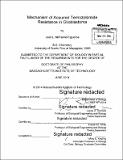Mechanism of acquired temozolomide resistance in glioblastoma
Author(s)
McFaline-Figueroa, José L
DownloadFull printable version (14.88Mb)
Alternative title
Mechanism of acquired TMZ resistance in GBM
Other Contributors
Massachusetts Institute of Technology. Department of Biology.
Advisor
Leona D. Samson and Forest M. White.
Terms of use
Metadata
Show full item recordAbstract
Glioblastoma (GBM) is the most common and malignant form of brain cancer. After aggressive treatment, therapy resistant tumors inevitably recur. However, the molecular mechanisms underlying such resistance remain unclear. We isolated GBM cells resistant to temozolomide (TMZ), the frontline chemotherapy agent for GBM, and observed modest decreases in the mismatch repair (MMR) components MSH2 and MSH6. The modest decrease in MSH2, and relatively modest decrease in MSH6, did not seem sufficient to account for the very large increase in TMZ resistance. However, shRNA-mediated modulation of MSH2 and MSH6 levels in vitro confirmed that such decreases in MSH2 and MSH6 provide a potent mechanism for TMZ resistance. We demonstrate in an in vivo GBM mouse model that minor changes in MSH2 suppress TMZ-induced tumor regression, and moreover, show that even minor decreases in MSH2 transcript levels correlate with decreased survival in TMZ treated GBM patients. These modest changes in MMR are unlikely to alter classical markers of MMR deficiency, namely microsatellite instability and a mutator phenotype. Our results suggest that the involvement of MMR deregulation in mediating TMZ resistance is likely to be much more prevalent than previously appreciated. Additionally, we have employed phosphoproteomic network analysis to identify changes at the signaling network level that accompany the acquisition of TMZ resistance. Through mathematical and computational approaches, we identified changes that suggest increased PDGFR and integrin/FAK1 signaling in response to repeated TMZ exposure. Additionally, kinase motif analysis identified widespread alterations in phosphorylation of peptides containing motifs associated with the CDK/MAPK kinase family. Currently, we are applying molecular biology techniques to investigate the effects of these altered cellular signals on MMR activity and the sensitivity of GBM cells to TMZ.
Description
Thesis: Ph. D., Massachusetts Institute of Technology, Department of Biology, 2014. Cataloged from PDF version of thesis. Includes bibliographical references.
Date issued
2014Department
Massachusetts Institute of Technology. Department of BiologyPublisher
Massachusetts Institute of Technology
Keywords
Biology.